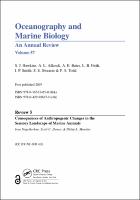Chapter 5 Consequences of Anthropogenic Changes in the Sensory Landscape of Marine Animals
Proposal review
Author(s)
Nagelkerken, Ivan
Doney, Scott C.
Munday, Philip L.
Language
EnglishAbstract
Human activities are altering a wide range of key marine cues at local and global scales, and it is important to know how animals may respond. Species survival and performance depend on the ability of individuals to successfully extract and interpret information from their environment about preferred abiotic conditions and the presence of prey, predators, competitors, mates and suitable habitats. Such information is made available via a wide range of abiotic and biotic cues that can be detected by organisms through various sensory modalities. Global anthropogenic changes, however, are rapidly altering the sensory landscape (‘cuescape’) and behaviour of animals by modifying the production, transmission and interpretation of critical natural cues, as well as introducing novel anthropogenic cues. To date, most studies have focussed on how animals respond to such changes rather than investigating how the cues themselves are changing. Because the responses that individuals show ultimately depend on factors affecting both the generation and reception of cues, better integration is needed to understand how these factors ultimately affect individual performance. This review provides a holistic assessment of how multiple cues (e.g. sounds, visual cues, chemicals, salinity, temperature and electromagnetism) are being altered at different spatial and temporal scales in marine habitats. Natural cuescapes are being modified by humans and novel anthropogenic cues are being introduced into the ocean, both of which can directly and indirectly alter the diversity and strength of natural cues. Examples are provided of how species might respond to such changes, focussing on what coping and adaptation mechanisms are available for species to persist in a future ocean. While ‘sensory generalist’ species may prevail in marine environments with diminishing or masked natural cues, some ‘sensory specialists’ might sustain themselves via sensory compensation, behavioural plasticity or avoidance of detrimental cues in the short term, or via genetic adaptation in the longer term. Due to the rapid loss of natural cuescapes, alternative research agendas are needed to monitor and measure multicue changes throughout the oceans. Together with mechanistic and field studies of animal responses, such research can inform management by identifying the species most at risk and the areas that may be suitable for cuescape preservation.
Keywords
anthropogenic changes; sensory landscape; marine animals; consequencesISBN
9780429026379OCN
1135845204Publisher
Taylor & FrancisPublisher website
https://taylorandfrancis.com/Publication date and place
2019Imprint
CRC PressSeries
Oceanography and Marine Biology : An Annual Review,Classification
Earth Sciences, Geography, Environment, Planning


 Download
Download